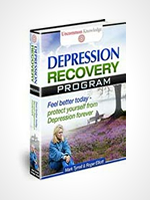Basic Needs Checklist for Depression
TO function 'properly', human beings need to meet a number of 'basic needs'. These are often taken care of by work, home life and pleasure pursuits; however depression can cause them to be impaired.
This list is given so that you can take a look at your own life to see if any area could be improved. Of course, anyone may fall down on one or two, but much more than that and you will probably be feeling the effects.
1. The need to give and receive attention
Human beings are social animals - we used to survive by being able to exist in close-knit groups, so the exchange of attention can be seen as almost as vital as food! This is why solitary confinement is seen as the ultimate punishment in today's jails. Without human contact, mental health degrades rapidly.
As depression causes you to participate less in social occasions, this need can be affected. You may also find yourself talking more about your problems to friends and family, hoping to find a solution.
While of course it is good to talk about problems to an extent, too much focus on them can put others off talking with you.
2. Taking care of the mind-body connection
This means, basically, looking after yourself. Eating regular, healthy meals, exercising appropriately, getting enough rest and relaxation. Again, this need is often impacted as depression sets in.
3. The need for meaning, purpose and goals
In the larger context, it is important that you have something to focus on outside of yourself. When a person becomes depressed, their sole goal can become to 'get rid of the depression'. They might say things like, "Once I've got rid of my depression, then I'll do X, Y or Z." This is perfectly understandable, but can worsen the situation as the person focuses on the depression more and more, to the detriment of their wider life goals.
4. The need for a connection to something greater than ourselves
People have been shown to be healthier generally when they feel comitted to some cause, idea or group that involves more than just their own well-being.
5. The need for stimulation and challenge
The human brain seems to have an innate need to create, and to absorb new information. Without an external source, the imagination can turn to creating all sorts of unpleasant scenarios, often increasing anxiety, rumination and worry, all bad for depression. The experience of being 'stretched', or using skills to their maximum in a focused way, is also an essential part of a healthy mind.
6. The need for intimacy and connection
We all need to feel that we are connected in some way to something or someone else. For some people, this can be fulfilled by a pet, but more often this needs to be another person or people. If a person cuts themselves off, this basic need can suffer.
7. The need for a sense of control
This is a key need, and it is obvious what happens when a person's life is controlled by others. Torture, imprisonment, violence and psychological abuse all remove control to varying degrees.
And of course, the place where we are used to having control is our own body and mind. Depression removes some of this control, as you wonder what is happening to you.
Completing the Learning Path should give you back some of your sense of control.







